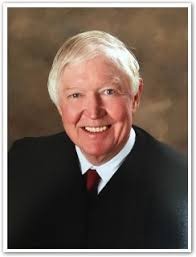
Judge William Acree
Remember the sample ballots you always saw at election time purporting to be “endorsements” of a group of candidates by this or that “Democratic” organization? Glossy with color mug shots of the lucky “endorsees,” these broadsheets did their best to resemble official documents of the Shelby County or even state Democratic Parties.
In reality, advertisements for the candidates in question is all they ever were — advertisements paid for by their campaigns and tricked out to look like official party statements by the local entrepreneurs who sold space on them.
“Endorsements” they were not, except in the technical sense that they signified the support of the shell companies that published and distributed them, most of these with the word “Democratic” in their name.
It was the misleading aspect of these advertisements that made them targets of litigation by candidates, Democrats in the main, running legitimate campaigns for office and boasting no such false endorsements.
Now, several hearings over several years later, a judge has imposed a permanent injunction against such published products.
The ruling comes from Judge William B. Acree, a senior jurist from Jackson, after a January 6th hearing in the case of Tennessee Democratic Party and candidate John Marek vs. Greg Grant, individually, & d.b.a. Greater Memphis Democratic Club and M. LaTroy Williams, individually, & d.b.a. Shelby County Democratic Club. This was the climactic one of three hearings — the others having occurred on October 20, 2019, and October 3, 2020.
Those prior hearings had imposed temporary injunctions against the defendants and imposed penalties for renewed infractions.
Judge Acree based his judgment Thursday on TCA statute 2-19-116, which reads:
No person shall print or cause to be printed or assist in the distribution or transportation of any facsimile of an official ballot, any unofficial sample ballot, writing, pamphlet, paper, photograph or other printed material, which contains the endorsement of a particular candidate, group of candidates, or proposition by an organization, group, candidate, or other individual, whether existent or not, with the intent that the person receiving such printed material mistakenly believe that the endorsement of such candidate, candidates, or proposition was made by an organization, group, candidate or entity other than the one or ones appearing on the printed material.
Acree’s order states:
The court finds that the Defendants engage in the distribution of campaign literature on behalf of candidates seeking public office, are paid for such activity, and have violated the statute and restraining order on previous occasions. Thus, the Court finds a permanent injunction shall issue enjoining the Defendants from: Distributing literature, disseminating information, or, in any way, communicating, utilizing work, symbols, or graphical schemes reasonably implying endorsement of or affiliation with the Democratic National Convention, the Tennessee Democratic Party, or the Shelby County Democratic Party.

